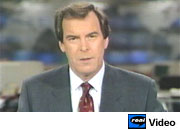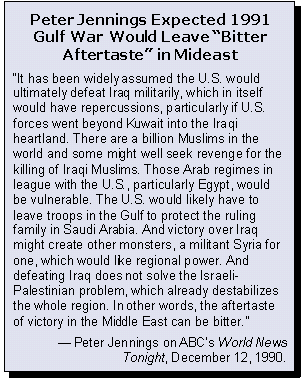 |
|||||||||
|
 |
||
|
 |
||||||||||||||||||||||||
|
||||||||||||||||||||||||
 |
||||||
|
||||||
 |
||||||
|
 |
||||||||||||||||||
|
||||||||||||||||||
 |
||||||||||||||||||||||||
|
||||||||||||||||||||||||
 |
||||||||||||||||||
|
||||||||||||||||||
|
|
|
For Immediate Release: Katie Wright (703) 683-5004 - Thursday,
October 3, 2002

MRC Study: World News Tonight Painted U.S. as Aggressor ABC's War Against Bush's Anti-Iraq Policy When Sean Hannity pressed Peter Jennings about media bias on his afternoon radio show Tuesday, ABC's anchorman explained how he could - hypothetically, of course - skew his newscast's roster of stories. "The way we select things to do, things you select to do on your broadcast, the things we select to do on the evening news, show that we're very interested in certain aspects and areas of public life," Jennings admitted, adding that most of the people who do the picking and choosing are liberals: "It hasn't been until the last decade and a half that there have been more conservative views in the media, and there still aren't enough."
That's an understatement. The type of bias Jennings was talking about - social scientists refer to it as "agenda-setting" - has been on display in his own newscast's skewed coverage of a potential war with Iraq. On this issue, ABC has stood out from the liberal pack; neither NBC nor CBS has been as aggressive at portraying the U.S.-Iraq conflict as driven by a reckless Bush administration and imposed on an unwilling Congress and nation. • More airtime for skeptics. As ABC told it, the Bush administration was practically alone in believing that it was a good idea to use force against the recalcitrant dictator. Of the 60 sound bites from sources opining on the use of force, more than half (36, or 60%) were anti-war, but Bush administration officials accounted for 17 of the 24 sound bites advocating a tough line. Excluding the administration's quotes, along with those of Iraqi officials like Tariq Aziz, left an even more lopsided 82 percent anti-war advantage. The quotes themselves reveal ABC's unique agenda. On September 27, for example, Jennings drew viewers' attention to an anti-war protest that neither CBS nor NBC deemed worthy of coverage. "Among the slogans chanted today," Jennings helpfully transmitted, 'No blood for oil,' and 'No war for votes.'" Two days later, after Rep. Jim McDermott stood in Baghdad and called President Bush a liar, only ABC sent cameras to Seattle in search of voters who agreed with their congressman. "I share the view that we're, we may be being misled," a woman obliged. "I'm glad he has got the courage to speak out," echoed a man. • Who's the aggressor? Rather than highlighting Saddam's military build-up, ABC rhetorically painted the U.S. as the provocative party. "President Bush, under pressure for his threats against Iraq," Elizabeth Vargas teased at the top of the September 2 broadcast. Later she referred to "increasingly angry U.S. rhetoric against Iraq." Likewise, when the United States submitted a tough draft resolution to the UN, Jennings was frantic. The U.S. "demands are so tough and so explicit," he argued September 27, "it is hard to imagine Iraq, and for that matter, many U.S. allies, going along." ABC reporters applied such language to the U.S. in seven stories, but only twice cited Iraqi conduct as contributing to the crisis. Referring to the 1991 Gulf War, Terry Moran noted September 13, "the same Iraqi diplomat who represented his government then, once again said Baghdad would defy the UN and reject weapons inspectors." But by September 29, Iraq had changed its public statements about inspections, so anchor Carole Simpson asked what the U.S. thought about an Iraqi meeting with the UN. Reporter Tamala Edwards portrayed the White House as spoiling for a fight: "They say they don't care. They're disdainful and dismissive of this meeting. As one administration official said to me, 'The Iraqis have no vote, no voice, no say. All we care about is the UN.'" • More skeptical of the Allies. ABC reporters pointed out Iraq's deviousness in three stories, but questioned the truthfulness of U.S. and British statements in eleven, or nearly four times more. After Saddam's spokesmen claimed weapons inspectors could again work in Iraq, for example, ABC's Martha Radditz pointed out that "the first day inspectors arrived in Iraq 11 years ago, with a promise of free access, they faced difficulty. The Iraqis repeatedly deemed some sites off-limits, sometimes getting physical with inspectors."
Likewise, when Bush advisor Condoleezza Rice said new information linked the al Qaeda terrorist network with Saddam's Iraq, Moran, Jennings and Radditz all doubted it. "Today, the administration made a brand new accusation," Jennings told Moran on September 26. "Well, it did come out of the blue," Moran agreed. Radditz let an unnamed source deliver the coup de grace: "A senior intelligence official tells ABC News there is no smoking gun. There's not even a smoking unfired weapon linking al Qaeda to Iraq." While ABC couldn't find any links, a week later CBS's David Martin reported "tantalizing leads" on the October 1 Evening News. "The clearest link so far," Martin cautiously reported, "at least one senior member of al Qaeda fled to Baghdad after 9/11. He has since left Baghdad, and there is no evidence that Saddam knew about it - although in a police state like Iraq, people don't just come and go." • Congress: publicly supportive but secretly opposed. While a majority in Congress appears willing to back Bush's Iraq efforts with their votes - Democrats and Republicans rallied in the Rose Garden yesterday - most of the sound bites from lawmakers on World News Tonight (83%) opposed using force. That meant ABC had no problem finding anti-war quotes, but its reporters still insisted Bush had suppressed congressional dissent. Some Democrats, Linda Douglass relayed on September 25, "have complained that Democratic leaders are too eager to go along with the President....[Democratic Senator Dianne] Feinstein says that many of her colleagues agree with her, but have been afraid to say so until today." Referring to McDermott's Baghdad blast at Bush, John Cochran on September 29 argued that support for Bush was based on expedience, not agreement. "McDermott is a liberal in a liberal district, expected to win re-election without breaking a sweat.... Other Democrats facing close races feel it is a lot safer to challenge the President on domestic issues." • An anti-war activist's self-serving analysis. On September 8, ABC's Mike Lee described Britain as "a hornet's nest of dissent" against Prime Minister Tony Blair for backing the U.S. "Even a majority of lawmakers in Mr. Blair's own ruling Labor Party appear not to support their leader," Lee asserted. He showed a clip of Blair defending his policy, but interviewed only one source, Labor MP Jeremy Corbyn, who claimed that, "In Europe there is overwhelming opposition to this idea of a, sort of, gung ho mentality - 'We've got the arms, we've got the power, we'll go in and sort it out.'" But ABC didn't identify Corbyn as a leader of Britain's anti-war movement, hardly a dispassionate observer. As for the majority Lee believed opposed to Blair, the Prime Minister won his party's backing at a Labor conference October 1. Citing the need to ask the "tough questions" before the shooting starts, some journalists have implied that it's okay to skew the news in an anti-war direction. But the seriousness of an impending war doesn't lessen the need for balance, it heightens it. ABC could improve its coverage by focusing at least as much time on the threat posed by Saddam as the "threat" that anti-war critics perceive in America itself. -- Rich Noyes
Home | News Division
| Bozell Columns | CyberAlerts |








 But ABC spent more time undermining the anti-Saddam coalition's arguments. When U.S. and British planes responded to Iraqi violations of the southern no-fly zone, ABC's John McWethy was dubious of the official line. "It may all be business as usual, as the administration claims, Peter, but everything that we are describing today could also be seen as small steps in preparing the ground for war," he stated on September 5.
But ABC spent more time undermining the anti-Saddam coalition's arguments. When U.S. and British planes responded to Iraqi violations of the southern no-fly zone, ABC's John McWethy was dubious of the official line. "It may all be business as usual, as the administration claims, Peter, but everything that we are describing today could also be seen as small steps in preparing the ground for war," he stated on September 5.